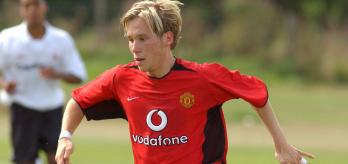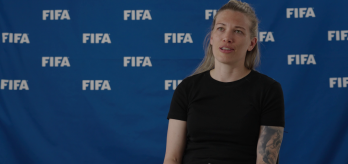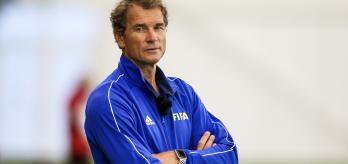Part 1 - Neumayr's career
0:07
Markus's coaching journey
Markus obtained some coaching experience as a player-coach during his time at Manchester United. However, his full-time coaching career started two years ago, after he hung up his boots. Before he took on his current role at FC Basel, he decided to start his coaching career in amateur football, an area of the game he had never had the chance to experience.
0:54
Club career
Markus's club career took him all over the world. At roughly 16 years of age, he received a call from Sir Alex Ferguson, one of football's most decorated managers. The call marked the beginning of a three-year stint at Manchester United. After leaving the Red Devils, Markus moved to MSV Duisburg, who were then in Germany's 2. Bundesliga and were immediately promoted to the top flight in his first season. He later played for teams in Belgium, Turkey, Iran and Switzerland before retiring.
2:30
Moving to Eintracht Frankfurt's youth setup
When Markus was 12 years old, he was given the chance to join Eintracht Frankfurt's academy. After discussing it with his parents, Markus accepted the German club's offer, and made his first step on the elite player pathway.
Part 2 - A prodigy at Manchester United
0:06
An offer from Manchester United
By the age of 16, it was clear Markus was a prodigy. He was featuring in Germany's youth national teams and a list of Europe's top clubs were knocking at the door, looking to bring him to their academies. However, Markus had always dreamt of playing for Manchester United, who were fielding world-class players such as David Beckham and Paul Scholes at the time. As soon as the offer came from Old Trafford, and thanks to his parents' support, Markus made the big move to England.
1:12
A football education at United
At first, life at United was surreal. Academy players used the same facilities as the first team, meaning Markus rubbed shoulders with some of the greatest players of that era on a daily basis. They taught him how to conduct himself both on and off the pitch. Markus admits it was sometimes challenging to process this wealth of information in such a short period of time, especially at just 16.
2:21
The core tenets of United's football education
Ferguson's playing philosophy trickled down from the first team throughout the rest of the club. United's playing style was heavily focused on possession: Sir Alex set them the target of being the best ball-playing team in the country. At the same time, the club emphasised the importance of transitions and regaining possession. The system used to implement this style was a flat 4-4-2, a formation adopted by every one of the club's teams from the U-17s upwards. This consistency of formation and philosophy helped younger players slot into the first team seamlessly if they were called up.
3:44
The benefits and drawbacks of the United system
For younger players, having the same philosophy and system all the time can provide security and support, because they know precisely what is expected of them at every stage of the pathway. This consistency can also be beneficial for the club. However, as Markus explains, the fixed positions in a flat 4-4-2 can restrict experienced players looking to express themselves on the pitch.
Part 3 - Missing out on United's first team
0:06
Missing out on United's first team
The fact that Markus was not selected to play for the first team was a significant blow. During his final year at the club he was called up to the first team squad (which included only 16 players), but Markus still couldn't get that elusive debut. A few months after featuring in the squad, Ferguson told Markus that he no longer saw his future at Manchester United.
1:38
Markus's mistakes in Manchester
Markus feels that one area he needed to improve at United was his mindset: he was not mentally strong or level-headed enough. As he explains, he was too emotionally volatile: if he played well, he would feel incredible, but if he had a bad game, he would feel devasted. Over time, this emotional volatility was draining. In hindsight, and as a coach, he realises that a player who performs consistently well is more valuable than one who is brilliant but unpredictable.
2:33
Markus' Manchester United team-mates and their success
A player's mentality is important in determining whether they make it to the first team, but it's not the only thing that matters. Sometimes, luck is important, too. For instance, an injury to a senior player would often allow a youth player to showcase their ability. On the other hand, even if an injury provided an opening for a younger player, that player had to be at their best; a poor performance could ruin their chances of establishing themselves. Markus believes that success comes down to a combination of smaller elements, rather than one decisive factor.
Part 4 - Advice for young players today
0:06
Advice for young players today
Markus recommends that youngsters should take time to reflect deeply if they encounter a setback like the one he suffered at United. Reflecting also means thinking about the nature of the club involved. Top clubs have an abundance of world-class players, and might only select two or three young talents for the first team. Smaller clubs aren't in such a privileged position, and are more likely to field youngsters as a result.
1:04
Should young players start their journey at smaller professional clubs?
The size of the club isn't the only factor a young player should consider when deciding which professional club to join. For example, the structure of the first-team squad and the first team coach's willingness to field young players are also significant. A young full-back is less likely to get game-time in the first team if there are already four exceptional full-backs in the squad. Likewise, a youth player will find it difficult to reach the first team if the coach is reluctant to field players under the age of, say, 22.
2:08
Difficult decisions in football for players and parents
Youth players can face all sorts of challenges, and the best way to deal with them will depend on their situation. As Markus explains, in his personal experience, living alone in England and not being fluent in English made life more difficult. He stresses that players should think carefully about these challenges, along with factors such as squad structure, when deciding where to make their next step.
Part 5 - Applying experience
0:06
No regrets
Markus is incredibly grateful for the way his playing career unfolded. He was lucky enough to make over 200 appearances in top divisions across the world, and to play Champions League football. Considering that Markus came close to hanging up his boots aged 20, he had a massively successful career.
1:12
The pros and cons of a large club staff
The world is evolving rapidly, and football is no exception. Both the physical and mental demands of the modern game are becoming more significant. Markus feels that having a highly specialised coaching staff can be useful when dealing with these increasing demands.
2:52
Impressions when coaching 12 and 13-year-old players
Coaching players of this age is an excellent opportunity to learn about how today's youngsters see the world. Overcoming the generation gap between coaches and players is a significant challenge, and one Markus relishes. Finding the right mix of tried-and-tested wisdom and the latest coaching techniques is key to success, and Markus often shares ideas and insights from his playing days with the young players he coaches.
4:18
Helping youth players mentally
When it comes to the mental aspects of coaching youth players, Markus uses techniques he wishes his own coaches had used when he was a player. He makes sure his players get a good balance of positive and constructive negative feedback, and always encourages them to engage proactively with the game.
For me, coaching is a very good opportunity to get to know the youth of today















